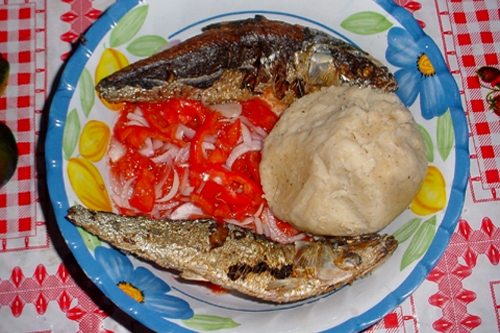There is no escaping the hard times brought on by the sudden hikes in food and fuel prices. Even if you don’t have a car and you don’t spend money to move around from one end of town to another (say you are unemployed and you have little choice than to stay home all the time), you will realise that you now pay 30p for a ball of kenkey which is quite smaller than the one you used to buy for 10p.
Sometimes, you get the kenkey and you realise that it’s been recycled for about five days. Gone are the days when kenkey sellers discarded products more than two days old. Auntie Akweley knows that she owes you no explanation and you dare not ask her what’s going on. She might be as pissed off and frustrated as you are because she’s also very shocked that all her profits are being eroded by the hikes in the cost of her raw materials. The money she used to buy three sacks of corn with can now get her just two bags. So don’t dare ask her why her kenkey keeps shrinking in size and why she sells ‘expired balls’.
For answers, just turn to the newspapers. Even ‘P&P’ is reporting on the difficulties many around the world are facing as a result of a global food shortage and the recent dramatic and record-breaking hikes in crude oil prices.
It’s crazy and it’s annoying and it’s frustrating. And for those in power, it’s very worrisome. In these hard times and with an election looming, if the ruling class wants to remain in power they do not want to be seen to be unconcerned as people fight over lorry fares and the size of kenkey.
That’s why president Kufuor decided to personally announce his mitigation plan, which he hopes will help us weather these economic storms and possibly, if we are convinced that he cares enough, return his party to power. “I am appealing to you all to rally behind government to ensure that our society goes through these difficult times with minimal stress,” he said in a pre-recorded but very badly edited television address to the nation.
In that address, the president announced measures including the removal of import duties on some staples such as rice, wheat and yellow corn. Government also intends to remove some taxes and levies on petroleum products such as diesel, premixed fuel and kerosene.
It all sounds like a good plan.
- Advertisement -
But I’m not sure if these measures will mitigate my suffering in anyway. What I know for sure is that in this country prices don’t go down. They only go up. Therefore the president’s order to “dealers (in rice, vegetable oil etc.) and transporters to reduce prices and fares to benefit consumers and passengers” will fall on deaf ears. Drivers have said it before and I won’t be surprised if they say it again that they do not fix their fares solely on the basis of increasing fuel prices. They buy spare parts too.
I believe there should be some very good economic reason why the president chose to remove taxes and levies on kerosene and gas oil but decided to retain the taxes on premium petrol. Unfortunately, transport fares are fixed for all ‘trotros’ and buses without any regard for whether they are fuelled by diesel or petrol. So bringing the price of diesel down and maintaining that of petrol will yield very little or nothing. If the diesel car drivers bring down their rates, those who use petrol vehicles will not do the same. And where does that leave us? Square one.
The decision to remove import levies on rice, yellow corn and vegetable oil also makes sense. But only on the surface. And the president knows it. That’s why he warned that it would be a criminal offence to attempt to re-export any of the products whose import duties have been removed. Our customs agents will have a lot of work to do because a lot of people are going to try to do exactly what the president does not want them to do. I have no doubt that most of them will get away with it – with the help of those who are supposed to stop them.
I won’t be surprised if sometime in the next few months, the president comes back to tell us that he has changed his mind because his mitigation measure is only helping some individuals to line their pockets instead of helping the poor deal with a very difficult economic situation.
Another area of concern to me is that some traders are going to keep their prices at current levels and insist that they cannot sell old stock at reduced prices. And there is nothing government can do about it. Remember, prices in Ghana hardly ever go down. Forward ever, backward never – upward ever downward never.
All told, what is a government to do in the current circumstances? Well, I think the government should have done nothing. These price hikes started in 2007. If it had gotten as bad as it is now in 2006 or in a year in which we were not going to vote, the government would have done nothing. They would have told us that it is economic reality and we need to “bite the bullet” and “tighten our belts”.
The president has used these expressions several times before – when the going got so tough and he knew we had very little choice. But this is a different year. He’s going out of power but he would like to see his party retain power. And so he comes up with this raft of measures which are only useful because they are politically expedient for the ruling class. “We are a caring government,” I’ve heard several ministers say in praise of the measure the president announced last week. If only they could be as caring when they are not asking for our votes. I am very sure that immediately after the elections we will be slapped again with the levies and taxes.
So here is a thought: how about giving us some cash? Yes, if they are so caring they should give us money to spend. Each Ghanaian should be given about GHC300 – whether or not petroleum levies and import duties are removed. George Bush did a similar thing recently and Mr. Kufuor can do the same. Can you imagine how many balls of kenkey and bags of rice GHC300 can buy?
If they also care so much, they should start making long term plans instead of adopting knee jerk measures. If they had any long term plans, we wouldn’t now be thinking of stockpiling food with help from “development partners.” We would have had silos all around the country and stockpiling food would have been a national habit. Even the rats and ants stockpile food and we don’t? What is wrong with us? Considering that we don’t have any silos in the country right now, I wonder where the new food stockpiles will be kept. Hotel ‘Waawaa’ or where? Now, doesn’t that make you want to be a rat?

